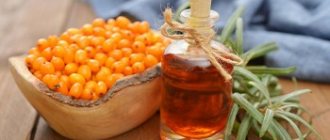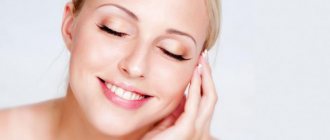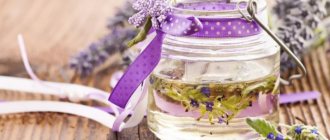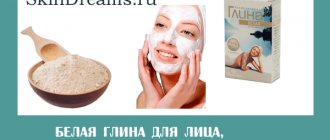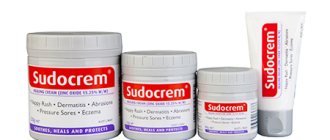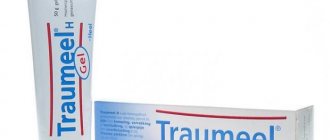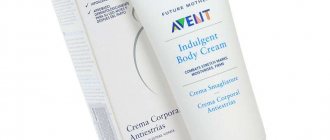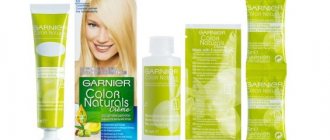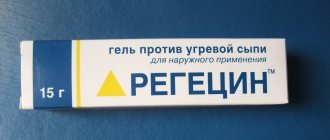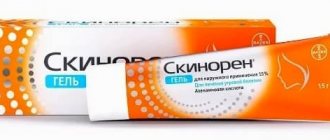Rosemary is a unique evergreen plant that is used in cooking as a spice in many dishes. But this is not the only value of rosemary. The plant has many healing properties; in ancient times it was used to treat diseases, as a talisman and protection against bad dreams. Rosemary sprigs were carried with them to attract happiness, strengthen memory and preserve youth.
Today, rosemary oil is often used for acne, since this natural substance retains all the benefits of the plant to the fullest. This oil is obtained by steam distillation. The liquid has a spicy, slightly bitter aroma, with light woody undertones and a yellowish color.
Rosemary: benefits and harm for the skin
Rosemary oil is widely available in pharmacies, as well as from manufacturers of natural cosmetics. High-quality essence has undeniable benefits for acne and post-acne.
Helps:
- Destroy pathogenic microorganisms;
- Eliminate the inflammatory process;
- Increase the ability of tissues to regenerate;
- Improve local immunity;
- Narrow pores;
- Reduce swelling;
- Regulate sebum production;
- Get rid of isolated acne elements;
- Cope with scars, pigmentation, small scars;
- Restore moisture balance in the dermis;
- Reduce the severity of wrinkles;
- Achieve soft skin;
- Normalize blood microcirculation;
- Accelerate the healing of chronic psoriasis, dermatitis, eczema.
Pure ethers cannot be used: they can cause itching, redness and even burns. Rosemary oil is intended to enrich finished cosmetics or add to basic foundations. The pronounced smell of undiluted essence also provokes:
- Anxiety;
- Blood pressure surges;
- Dizziness;
- Insomnia when inhaling the aroma before bedtime;
- In rare cases, seizures.
The benefits of rosemary oil on the skin
| Rosemary oil is a natural product that has a positive effect on the skin. | |
It can be used in the following cases:
For the care of problematic and oily skin
Rosemary reduces oil secretion, fights blackheads and acne, tightens pores and gives the skin a healthy appearance.
To cleanse skin from inflammation
The oil has anti-inflammatory, antiseptic and bactericidal properties. Doctors recommend rosemary oil as an additional remedy for the treatment of dermatitis, eczema, boils and other purulent-inflammatory diseases.
To get rid of acne marks and scars
Rosemary oil has a absorbing and smoothing effect.
We suggest drawing your attention to the drug Contractubex, which is successfully used to get rid of scars and acne marks. Thanks to its action, the skin becomes more elastic and spots become less noticeable.
For treating dry or rough skin
Thanks to the oil, it becomes soft, acquires a healthy appearance and elasticity.
To eliminate swelling and normalize water balance
Rosemary oil is a reliable assistant in the fight against age spots, puffiness and wrinkles. Regular use tones the skin, restores elasticity and improves complexion.
Rosemary oil helps get rid of many skin imperfections. But before you eliminate pimples and blackheads, find out the reasons for their appearance. You may need to not only carefully care for your skin, but also change your lifestyle, diet and cosmetics.
Rosemary oil for acne: application
The simplest way is to combine rosemary essential oil for acne with a base suitable for your dermis type:
- Oily: mix rosemary oil with jojoba extract in a ratio of 1:3;
- Normal: combine the extract with an oil extract from flax, olive, almond (25% of each ingredient);
- Dry: mix rosemary and apricot oil in proportions 1:2.
The mixture must be applied locally to pimples, after 35 minutes blot with a clean cloth. The procedure is indicated for use every day. For severe acne, treatment up to 3 times a day is allowed.
Cosmetologists and dermatologists recommend adding rosemary oil for acne to the following homemade face masks:
- Mix a tablespoon of milk thistle ether with 2 drops of oil. After 40 minutes, remove the remaining composition with a cloth;
- Pour the contents of the Aevit capsule into a bowl. Add a drop of oil. Lubricate the affected areas, after 20 minutes remove the residue with napkins;
- Grind 12 g of rice in a coffee grinder. Mix with 8 drops of rosemary and a pinch of cinnamon. Steam your face thoroughly before use. After 20 minutes, cleanse your face with water and a few drops of grapefruit juice;
- To a teaspoon of avocado or grape seed oil, add a drop of tea tree and rosemary oil. Gently spread over face until completely absorbed;
- Mix a tablespoon of full-fat cottage cheese and egg yolk. Enrich the mixture with essence in the amount of 2 drops. Keep on the skin for no more than 20 minutes;
- Mash 1 banana until smooth. Add ½ teaspoon of freshly squeezed lime juice to it. Add 9 drops of liquid vitamin E and 8 drops of rosemary oil. Leave on skin for 40 minutes;
- Prepare a mixture of 4 g of black clay, 9 g of white, 5 drops of macadamia oil and 12 drops of rosemary ether. Distribute over the skin for 10 minutes, rinse with chamomile infusion;
- Add 6 drops of essence to 15 ml of aloe juice. Precisely lubricate each papule and pustule;
- Dilute blue clay and kaolin with water until it becomes creamy. Add 5 drops of rosemary. Leave for a quarter of an hour, wash with warm water;
- Dilute 45 g of green clay with ¼ cup of heated water. Add 5 g of honey and a drop of rosemary. Wash off after 20 minutes.
Beneficial properties of rosemary
The first and main beneficial property of rosemary essential oil is its ability to smooth the epidermis, the outer layer of the skin. Very well-known companies that produce cosmetics not only for facial care, but also for skin restoration, use rosemary in lotions, tonics, and creams.
How do the components affect the skin:
- restore metabolic processes of intercellular tissues;
- soothe the skin;
- help accelerate the regeneration of cell membranes;
- restore blood circulation;
- have healing properties;
- get rid of age spots (freckles) due to the normalization of melanin production;
- restore skin smoothness and silkiness.
You can use rosemary oil for acne, hair, scalp and as a sedative.
Rosemary for acne spots
Medicinal rosemary is highly effective against acne spots. The following methods are effective:
- Treat acne spots in the morning and evening with a mixture of 5 ml of sesame oil and 2 drops of rosemary. The sesame base can be replaced with cocoa butter, having previously melted it;
- Combine 5 ml of base base and 2 drops each of tea tree and rosemary ether. Apply as the previous composition;
- Mix equal parts rosemary and sea buckthorn oil. Apply only to pigmented areas, without affecting healthy tissue;
- Apply a few drops of oil to a cotton sponge. Apply to the large remaining mark and secure with adhesive tape. Remove the lotion after 3 hours or if there is a severe burning sensation.
Why to love and praise rosemary oil
The beneficial properties of rosemary oil, of course, are associated with its chemical composition. Just a few words about him. The composition of rosemary oil includes: α-pinene (about a third), camphene, cineole, tannins, limonene, borneol, camphor .
Don’t let the abstruse names of substances scare you, we won’t return to them again. But it is precisely because of these substances that rosemary essential oil has such beneficial properties for the skin:
- Reducing the level of fat and regulating the functioning of the sebaceous glands are the main and most striking beneficial properties of rosemary oil , for which those with oily and problem skin will love it.
- Antibacterial . Rosemary oil, penetrating the skin, destroys bacteria and microbes - the main “culprits” of acne. And the oil copes with this task 100%.
- Anti-inflammatory . Absorbed by the skin, the oil penetrates into areas of inflammation, neutralizes them and soothes the skin.
- Restorative and nourishing properties - these are the reason why rosemary essential oil is so good for blemishes, marks and acne scars . The oil stimulates skin regeneration, which allows marks and scars to disappear quickly and without problems.
As you can see, we have a worthy product for oily and problem skin. But don’t think that oil won’t help dry skin – it will help! And after studying the recipes, you will now see for yourself.
Continuing the topic of excellent and effective oils, I would like to advise you to read the article “Grape seed oil for acne.
Efficiency
Oils only work on the skin if used regularly. In this case, the cumulative effect will provide not only the elimination of acne, but also other positive effects:
- Reducing oily shine;
- Facial cleansing;
- Relief leveling;
- Gradual elimination of post-acne;
- Increased tone;
- Elimination of open comedones;
- Prevention of dermal aging.
The speed at which results are achieved depends on the extent of the lesion, the causes of acne and individual sensitivity to the composition.
Recipes for masks with rosemary oil
Rosemary oil is usually used in combination with other ingredients. It is rarely used in its pure form. It acts as one of the components of masks or lotions. It is also suitable for making compresses.
This product is highly concentrated. And in undiluted form, it is permissible to use it only pointwise on areas of very severe inflammation. With prolonged contact with skin, this oil can cause burns.
Spot Application
The product is used spot-on for large pimples. Dip a cotton swab into the solution and lubricate the inflamed area of the epidermis. This procedure must be done until the acne disappears, 3 times a day. The course lasts two weeks. It is permissible to repeat it in a month.
It is also used mixed with other essential oils. This method is incredibly popular in cosmetology.
- The beneficial properties of rosemary are numerous. In its pure form it has a powerful healing effect, and if you mix it with other oils, the effect will be amazing. This mixture helps against age spots: rosemary and celandine. Usually after a pimple there is a mark on the skin. This cocktail perfectly removes these stains.
- Sea buckthorn and fir in tandem with rosemary are also used in the fight against age spots. They lighten the epidermis, smooth out scars and unevenness after acne. Apply the mixture to clean skin, after steaming it.
- If it is necessary to cover a large area of the epidermis with the mixture, then it can be applied in low concentration, mixing with other components. The effect will be no worse than the spot application of the oil of this plant.
- Spots and scars that form after squeezing out pimples and blackheads with hands (not always clean) are a cosmetic defect of the epidermis. If this problem is not dealt with, the scars can remain on the epidermal surface for many years. The oil under discussion in combination with other ingredients will remove shallow scars on the epidermis.
- Essential oil with sea buckthorn and celandine will relieve inflammation from the affected skin area. This mixture will lighten the skin and make scars less noticeable. The dosage is selected in accordance with the stage of the inflammation process.
- To avoid the formation of pimples and their consequences, it is recommended to lubricate the face with a cotton swab, previously soaked in the following solution, for preventive purposes: 1 tbsp. plain water and 3 drops of essential oil. After regularly performing this procedure, the skin will be radiant and healthy.
- Pigment spots that appear after acne are noticeably lightened as a result of using this cocktail: two drops of essential oil plus two tea tree products. You need to apply the product to the inflamed areas with gentle movements. Repeat for several weeks in a row until visible results are achieved. It should be remembered that this plant has stimulating properties. All masks should be done in the morning, while the nervous system wakes up. If the mixture is applied at night, then there is a possibility of staying awake until dawn.
DETAILS: Papillomas on the hands and fingers. Causes and treatment
Spots and scars usually remain after squeezing out pimples with your hands. This absolutely cannot be done! You will only worsen the healing process, and the skin will undergo a new inflammatory process.
The plant has amazing properties. It is used mainly for acne and blackheads. It effectively helps fight scars after mechanical intervention. In cosmetology, there are many types of mixtures and gruels to eliminate the described problems.
Clay masks have always been used by girls with acne problems. And the reviews were only positive. Such products with etherol are still popular today.
You need to take any clay mixture, add a little of the described “wonderful” solution and mix thoroughly until it becomes a non-liquid sour cream. Apply to skin by hand or with a special brush. Leave for about thirty minutes and rinse under running water (preferably warm). After washing, apply a cream containing fatty components.
Simple compress
Add 3 drops of rosehip and grape seed oil to 4 drops of essential oil. Mix everything well, dip a sterile napkin or gauze into the prepared solution. Apply to inflamed areas of the skin and leave for twenty minutes. There is no need to rinse with water. It is permissible to wipe off the remaining mixture with a dry towel.
Severe cases of acne often leave marks in the form of scars and blemishes. To remove them, use this mask:
- Essential oil 1-2 drops;
- 4-5 drops of lime juice;
- A few grams of cosmetic black clay;
- 1 tsp mineral water with gas.
Mix the ingredients of the recipe thoroughly and apply the mixture to the inflamed areas of the epidermis. Leave for 15 minutes and remove with warm boiled water, since running tap water contains impurities that dry out the skin. This mask has an aggressive effect, so it is risky to overexpose it. Abuse is fraught with adverse reactions: redness and itching.
The described mixture relieves the inflammatory process, reduces peeling, and removes the effects of comedones. It can also be used for scrubbing purposes, using light circular movements, massaging a certain area of the epidermis. The effect will be the same as after a regular scrub.
Take one egg yolk, add 2-3 drops of essential oil, plus 50 g. fresh cottage cheese. After the manipulation, the epidermis will be saturated with useful substances and will acquire a healthy appearance and an even matte color.
Required: 3 tsp. olive liquid, 1 yolk and 3 drops of essential oil. Mix the ingredients and apply to the face. Remove from face with water after a quarter of an hour. If you use this mixture regularly, wrinkles will gradually smooth out. This remedy can also be used to eliminate small acne scars.
You can reduce the manifestation of rosacea by adding a few drops of essential oil to a cosmetic cream and applying it directly to the affected areas. Repeat the procedure daily, without neglecting regularity, until a visible result is achieved.
All dosages are selected individually, depending on the type of skin, the quality of the products, and the complexity of each specific case. But increasing the dosage of essential oil is not recommended due to its high concentration.
To avoid blackheads and acne on your face, you need to use the right treatment methods. Expensive pharmacy creams do not always help fight skin imperfections. You can spend a lot of time and money, but not achieve the desired result. One way out in this situation is rosemary oil.
It is rich in vitamins and other beneficial substances that have a beneficial effect on the epidermis. To get rid of acne and various cosmetic imperfections forever, you need to make a lot of effort. All masks containing essential oils should be used for a long time.
Clay mask
The modern cosmetics industry produces a variety of products to combat acne, blackheads and the marks they leave on the skin - post-acne. However, you can cope with these problems using natural remedies. A striking example of this is essential oils, the effectiveness of which has long been beyond doubt.
Essential oils easily penetrate into the deep layers of the skin, providing active effects:
- antimicrobial;
- anti-inflammatory;
- regenerating.
This is what explains their high efficiency and quick results. In addition to their healing properties, aromatic oils have a mild therapeutic effect on the body as a whole, help cope with stress, calm or invigorate, depending on the properties of the particular ester.
Essential oils will help tidy up your skin and eliminate acne and their marks.
Rules of application
Remember the main rule: aromatic oils should not be applied undiluted to the skin. This can cause redness, swelling and other manifestations of allergies, as well as chemical burns. An exception is the spot application of ether to the affected area using a cotton swab. This option is only allowed if you have good tolerance to the product.
In other cases, use aroma oils diluted: add 1-2 drops of essential oil to 1 tsp. base (or 4-7 drops to 1 tbsp.) and stir. This proportion is universal, but for different esters there may be other options - then this is indicated in the instructions or in the specific mask recipe.
As a base oil, you can choose olive, apricot kernel, jojoba, coconut and even sunflower
Reviews
Essential oils are gaining popularity not only as a basis for aromatherapy, but also for use in home cosmetics. Users rate rosemary as an anti-acne product highly. Reviews confirm the beneficial complex effect on the skin of the face and body.
Tatyana, 35 years old: “I use rosemary to combat post-acne. The effect does not appear immediately, but it is sustainable. I don’t have any special scars, almost no scars either, but the pigmentation is terrible after treatment with Roaccutane. It took 3 weeks of regular treatments and compresses for the skin to begin to lighten. I continue on, I hope that soon my face will be completely cleared of these terrible spots.”
Irina, 21 years old: “The first experience with rosemary oil was unsuccessful, but then I realized that the cheap product was most likely produced in violation of technology. I “splurged” on expensive essential oil from a manufacturer that specializes in oils and started making masks. Things went well. There are significantly fewer acne spots, redness and irritation have gone away. I will also use this remedy for prevention.”
Ekaterina, 29 years old: “Rosemary is my constant assistant in the fight against oily skin and acne. When ulcers appear, I mix it with tea tree and avocado oils. It helps a lot if you cauterize it regularly. At the same time, I use a black mask from China, as well as Intraskin spot cream. The combination works excellently, it was recommended by my cosmetologist who took courses in Britain.”
History of rosemary oil
The Roman writer Pliny claimed that this wonderful plant has amazing properties and can cure any disease. It has a rich and sweet aroma with a subtle pine note. In past centuries, people said that sea foam constantly stains the flowers of this plant and that is why they are blue, since rosemary grows on the sea coast.
Previously, it was used in the treatment of many diseases. Even in some religious rituals, this spice became an obligatory component, as it was considered sacred. Today it is used more often for culinary purposes, but rosemary can also be found in some preparations or suspensions.
In aromatherapy, this plant ranks first among other herbs. The oil obtained from its branches retains antiseptic, anti-inflammatory and healing properties.
To make the oil, rosemary flowers are taken and undergo a process of water-steam distillation. The output is liquid oil, light in consistency. It has a yellowish tint. Its aroma is exquisite: spicy notes with bitterness and at the same time with a fresh aftertaste.
Some more ways to use oil
The use of rosemary for aromatizing a room and massage helps improve performance, get rid of drowsiness, nervous tension, and headaches. Additional effect after aromatic procedures: strengthening the immune system and restoring the menstrual cycle. You can use rosemary in:
- aroma lamps;
- aroma baths;
- massage treatments;
- for enriching cosmetic masks and creams, nail strengthening products.
Rosemary essential oil has not only an amazing aroma, but also toxic properties. In high concentrations the product is poisonous, but in minimal quantities the EO can be used to flavor drinks, meat and vegetable dishes.
General description and composition of rosemary oil
Rosemary belongs to the evergreen shrubs of the Lamiaceae family. This plant can be found in Western Europe, Africa and some countries of the Balkan Peninsula.
Rosemary oil is obtained using water-steam distillation. This liquid is a saturated ether. The concentration of nutrients in it is several times greater than in a fresh plant.
Rosemary oil contains:
- terpene alcohols, terpenoids (camphor, pinene, cineole);
- vitamins A, C and almost the entire group B;
- polyunsaturated acids;
- potassium;
- calcium;
- zinc;
- iron;
- tannins;
- organic resins.
Rosemary oil is light yellow in color, thick and viscous, with a mostly uniform consistency. During long-term storage, the liquid may darken, and a slight sediment may sometimes be visible at the bottom. The essence has a characteristic herbaceous-spicy smell, in which camphor notes are clearly felt.
Rosemary concentrate can be used alone or together with other esters. It is often mixed with almond, argan, grape and other oils.
To aromatize rooms, you can combine it with citrus esters. For cosmetic purposes, it is better to add the essence to base oils (olive, grape seed).
View this publication on Instagram
Publication from Slings, Ergo-backpacks, for mothers (@vsemamamkld) Sep 16, 2017 at 10:47 PDT
Ways to use rosemary oil in home cosmetology
It is clear that for each problem there is its own method of effective combat. But all the ways to use rosemary oil at home are easy to implement. Even compositions that seem complex at first glance can be easily prepared at home. Rosemary essential oil is used in its pure form; compositions for medicinal compresses and masks are prepared on its basis. Special oil mixtures are very popular.
The choice of recipe depends on skin type, as well as individual sensitivity. The effect of essential products is so powerful that especially sensitive skin may experience irritation and other allergic manifestations after their use. This point must be taken into account.
